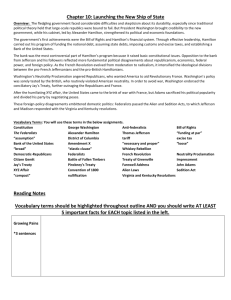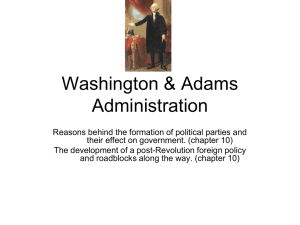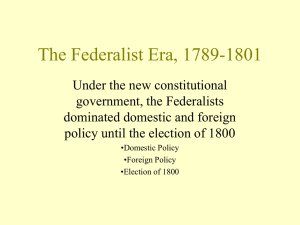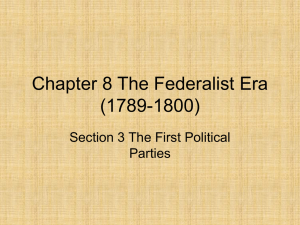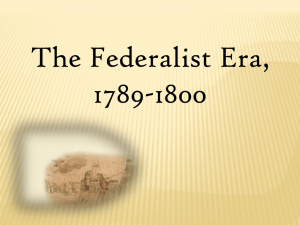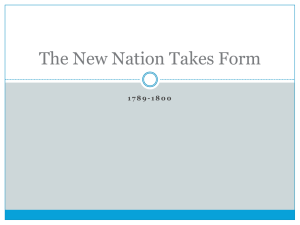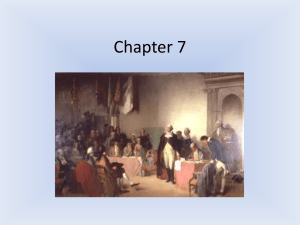CHAPTER 7 DEMOCRACY IN DISTRESS: THE
advertisement
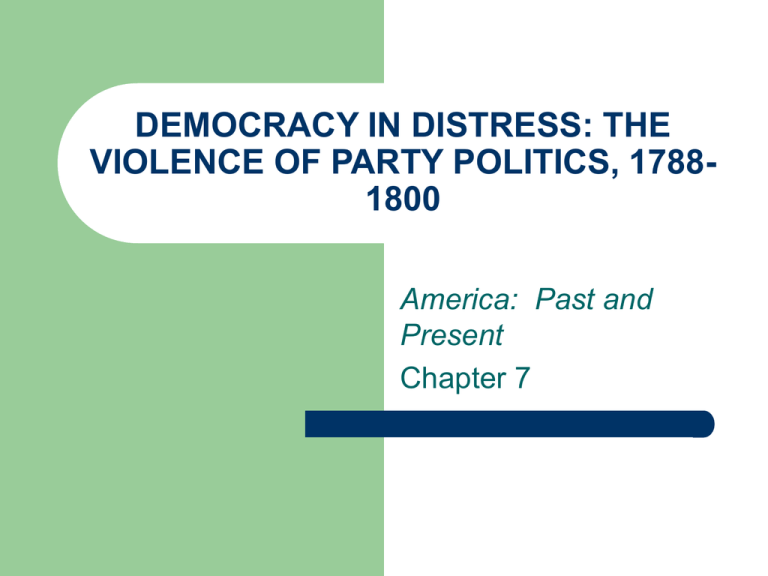
DEMOCRACY IN DISTRESS: THE VIOLENCE OF PARTY POLITICS, 17881800 America: Past and Present Chapter 7 Force of Public Opinion Root cause of political parties: ambiguity of republican ideology Federalists (Hamiltonians) stress national economy to preserve U.S. independence Republicans (Jeffersonians) prefer government small, local, responsive Parties agree on ends, differ about means Principle and Pragmatism: Establishing a New Government George Washington unanimously elected president, 1789 Washington’s reputation helps legitimize new government Dominant assumptions – – all will work together for the common good voters will defer to "betters" in political affairs Conflicting Visions: Alexander Hamilton Secretary of the Treasury Believed strong central government preserves national independence Envisioned U.S. as an industrial power Feared democracy would lead to anarchy Conflicting Visions: Thomas Jefferson Secretary of State under Washington Believed limited government preserves liberty Envisioned U.S. as an agrarian nation Trusted the common people Hamilton's Plan for Prosperity and Security A plan to pay off a federal debt of $54 million, additional state debt of $25 million Proposed "funding," "assumption" of debt Proposed national bank Proposed government aid to manufacturing Funding and Assumption Funding: Congress redeems federal certificates of debt at face value – Unsuccessfully opposed because most certificates currently held by speculators Assumption: federal government purchases states' debts – Initially defeated, salvaged through payments to Virginia, location of new capital on Potomac Interpreting the Constitution: The Bank Controversy National bank privately owned, Federally chartered to regulate finance Madison opposes as benefit to the rich Jefferson opposes as unconstitutional Hamilton defends constitutionality through doctrine of “implied powers” Congress charters Bank, 1791 Setback for Hamilton Report on Manufacturing (1791) seeks Federal encouragement for manufacturing Madison warns program will strengthen federal government at state expense Jefferson warns that the rise of cities will destroy agriculture and agrarian civic virtue Hamilton's recommendations defeated Charges of Treason: The Battle over Foreign Affairs European context – – French Revolution War in Europe Division over foreign policy divides nation Jeffersonian Republicans favor France Hamiltonian Federalists favor England The Peril of Neutrality Franco-British War breaks out 1793 England violates American sovereignty, neutrality on high seas – – Jefferson: punish England by cutting off trade Hamilton: appease England because too strong French diplomat Edmond Genet challenges American neutrality repeatedly in public Jay's Treaty Sparks Domestic Unrest John Jay to England to demand: – – – – removal of the English from American soil payment for ships illegally seized better commercial relations acceptance of United States’ neutrality Hamilton informs English U.S. not firm Jay’s Treaty wins no concessions Washington dislikes, but accepts, treaty Jay's Treaty Sparks Domestic Unrest (2) Senate ratified by smallest possible margin Newspapers viciously attack Treaty Republicans, press criticize Washington Nation rallies behind Washington Federalists brand Republicans as traitors Pushing the Native Americans Aside: The Ohio Country Battle of Fallen Timbers (1794)--U.S. Army defeats alliance of Indian nations in Ohio Treaty of Greenville (1794)--forces Indian removal from Ohio Country English withdraw support from Indians, pull back into Canada Pushing the Native Americans Aside: New Orleans & Florida Spain interprets Jay's Treaty as AngloAmerican alliance against Spain Treaty of San Lorenzo (Pinckney’s Treaty) – – – Spanish open the Mississippi to U.S. West Settle disputed border between Florida, U.S. Spanish cease supplying the Indians Conquest of the West Popular Political Culture Political “parties” condemned as faction Widespread concern over loss of common Revolutionary purpose Federalists and Republicans suspect each others’ loyalty Party members thought it a patriotic duty to destroy opposing party Informing the Public: News and Politics Common people highly literate Newspapers widely read, highly influential Newspapers shrill, totally partisan Political clubs promote political ideas Clubs associated with Republican Party Newspapers and clubs the main sources of political information Whiskey Rebellion: Charges of Republican Conspiracy Excise tax on whiskey imposed 1791 1794--Pennsylvania farmers protest Republican governor refuses to act Federalist interpret as Republican conspiracy Jefferson sees crisis as Federalist invention Washington's Farewell Washington not limited to two terms 1796--announces decision to retire Warns against political parties Announcement timed to prevent Republican organization of presidential campaign The Adams Presidency 1796-1800--Federalists control government Attempt to suppress Republicans Federalist division thwarts suppression The XYZ Affair and Domestic Politics Jay’s Treaty prompts France to treat U.S. as unfriendly nation Quasi-War: French fire on U.S. ships Diplomatic mission fails when three French officials (X, Y, and Z) demand bribe Provokes anti-French outrage in U.S. Federalists attempt to crush Republicans by branding as pro-French Crushing Political Dissent Federalists begin building up the army – – ostensible purpose: repel French invasion actual intention: stifle internal opposition Hamilton commands army, controls officers Hamilton seeks declaration of war against France to begin operations against dissent Adams refuses to ask Congress for war Silencing Political Opposition: The Alien and Sedition Acts Alien Enemies Act, Alien Act gives the president power to expel any foreigner The Naturalization Act requires U.S. residency of fourteen years for citizenship Sedition Act criminalizes criticism of the government Federalist appointees in federal courts enforce Sedition Act in absurd ways Kentucky and Virginia Resolutions Republicans see Alien and Sedition Acts as dire threat to liberty Jefferson’s Kentucky Resolutions--states may nullify unconstitutional federal law Madison's Virginia Resolutions--urge states to protect their citizens Purpose of resolutions: clarify differences between Republicans and Federalists Adams‘s Finest Hour 1799--Adams breaks with Hamilton Negotiates settlement with France War hysteria against France vanishes Hamilton's army seen as a useless expense Adams’ action costs him election in 1800 The Peaceful Revolution: the Election of 1800 Hamilton’s High Federalists lead campaign to replace Adams with Pinckney Federalists unpopular Republican Thomas Jefferson wins Attempts to unite nation by stressing values shared by each party Danger of Political Extremism Election of 1800 one of the most important Transfer of power from Federalists to Republicans achieved peacefully Nation averted ideological civil war
